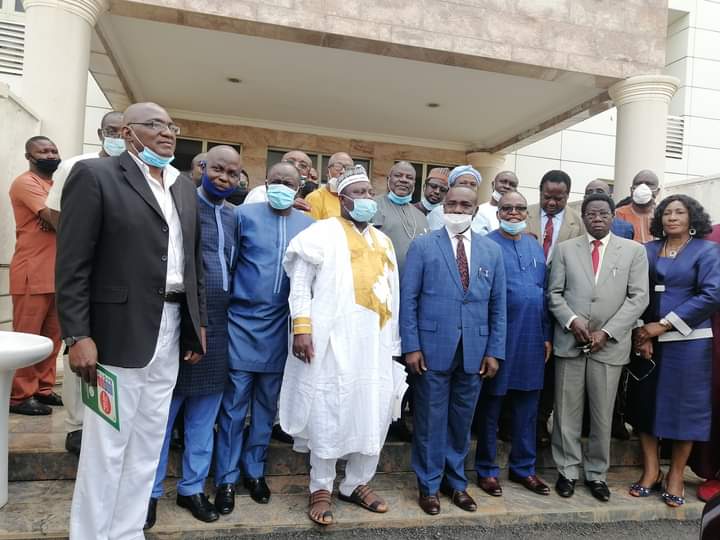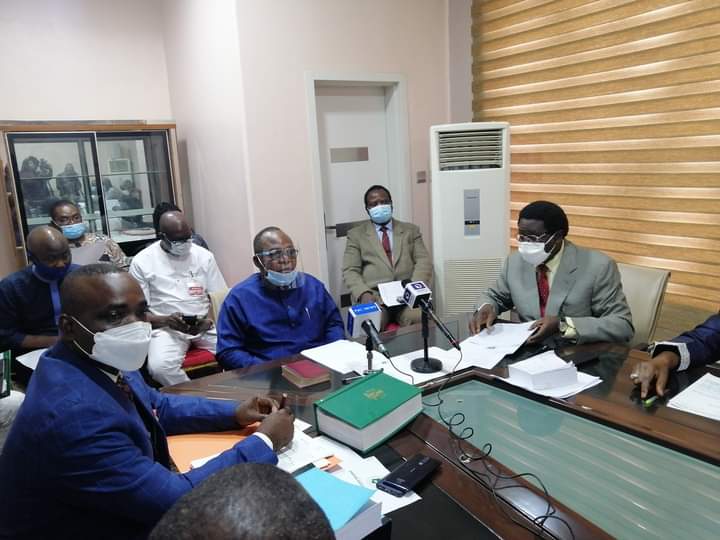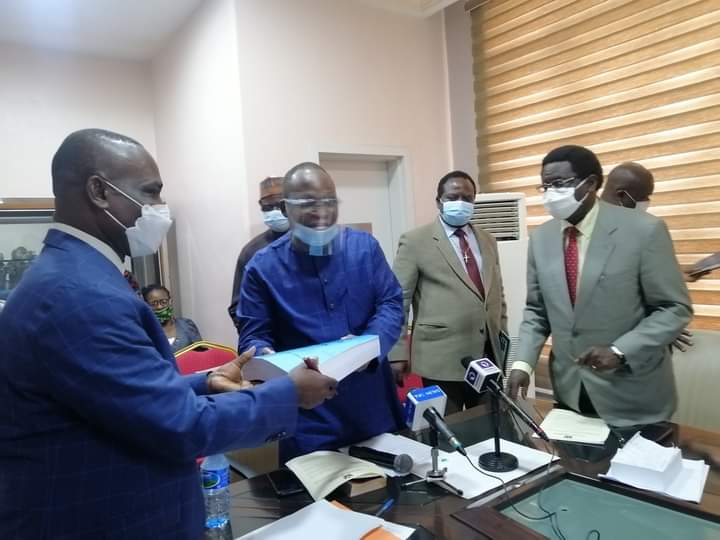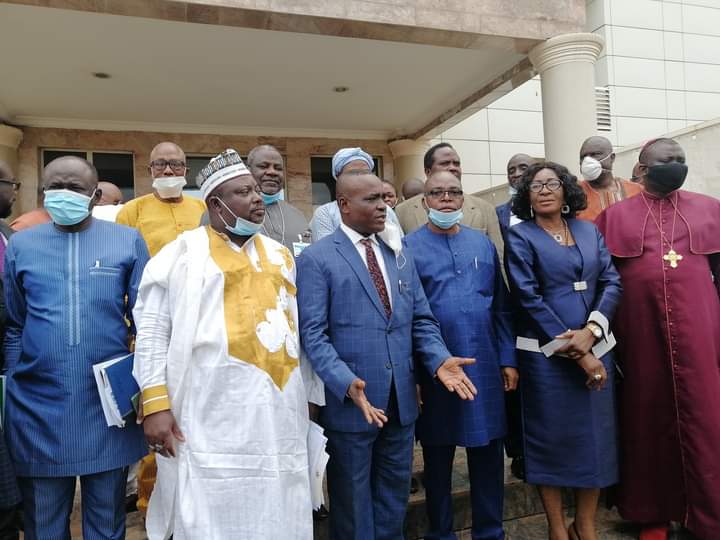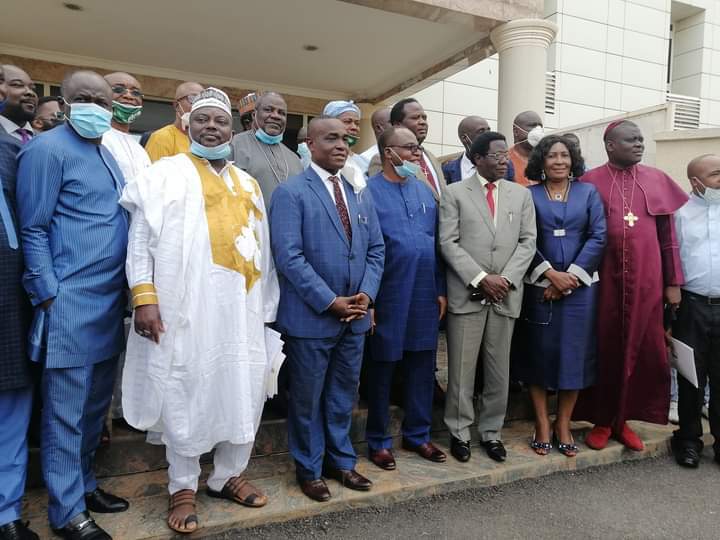
Senator Ita Enang, former Senior Special Assistant to President Buhari on National Assembly now Senior Special Assistant to the President on Niger Delta Affairs met the leadership of the Christian Association of Nigeria and some interested parties to explain the content of the Companies and Allied Matters Act 2020 recently assented by the President
The meeting which was monitored by 9new Nigeria has the following explanation from Senator Ita Enang:
“Let me appreciate the leadership of the Christian Association of Nigeria and indeed the advocating public for the platform to clear some misconception about the Companies and Allied Matters ACT 2020.
Misconceptions has enveloped this ACT with deliberate misinformation and falsehood by persons who may not have fully and in-fact personally read and digested the provision of the ACT. We consider it appropriate and responsible to appear before you and other fora to make these explanations.
First, the bill as it then was, was not an executive bill transmitted by President Buhari to the legislature but initiated by a Senator and member of the House in the respective chambers, at the behest of the Corporate Affairs Commission and support of the Ministry of Trade and Investment”.
“It was therefore not an executive bill, but upon passage was transmitted to Mr. President for assent.
Secondly, upon receipt of same for assent, Mr. President in accordance with extant best practice escalated the measure to appropriate Ministries, Departments and Agencies who made different inputs some of which lead to Mr. President declining assent twice to the bill in the entire tenure or life of the 8th Assembly”.
“Thirdly , as the 9th Assembly inaugurated, the bill was again re-introduced by Senators and Honourable members and all the observation made on the 8th Assembly bill incorporated and addressed, without any amendment or insertion and IN WHOLE passed by the two chambers and being without differences was transmitted to Mr. President for assent”.
“The bill as it then was became an Act-COMPANIES AND ALLIED MATTER ACT, 2020 (CAMA) upon assent.
It is pertinent to state that prior to this ACT, Incorporated Trustees or Law of Trust was regulated by the COMPANIES AND ALLIED MATTER ACT,1990, now repealed by the 2020 CAMA. This shows that trusteeship as now complained of was regulated by an ACT which has been in existence for 30 years and the practice and complaint arising therefrom can only reasonably generate improvement, amendment and incorporation of International best practice as in other nation states as well as guidance from judgement of court on matters relating thereto in the 2020 CAMA subject of this brief”.
“We want to declare as a fact, that the Act does not target churches or religious bodies as wrongly assumed. For illustration of this I present a tabular form of the provisions of the 1990 ACT which came into force on January, 2nd !990, which after more than 30 years of operation has now been repealed and replaced by CAMA 2020 hereunder are the comparative provisions in the two enactments to show particularly that the 2020 ACT assented to by President Muhammadu Buhari has not introduced any matter oppressive to the Christian Community or any religion nor any matter discriminatory against any class of persons in Nigeria”.
PROVISIONS OF CAMA 1990 CAP C20 LFN 2004
PROVISIONS OF CAMA LFN 2020
Section 590 of CAMA 1990 – INCORPORATION OF TRUSTEES OF CERTAIN COMMUNITIES, BODIES AND ASSOCIATION states thus “(1) where one or more trustees are appointed by any community of persons bound together by custom, religion, kinship or nationality or by any body or association of persons established for any religious, educational, literary, scientific, social, development, cultural, sporting or charitable purpose, he or they may, if so authorized by the community, body or association (in this Act referred to as the association) apply to the commission in the manner hereafter provided for registration under this Act as a corporate body (2) upon being so registered by the commission, the trustee or trustees shall become a corporate body in accordance with the provision of section 679 of this part of this Act.
Section 823 (1) of CAMA 2020 –
INCORPORATION OF TRUSTEES OF CERTAIN COMMUNITIES, BODIES AND ASSOCIATION states thus “(1) where two or more trustees are appointed by any community of persons bound together by custom, religion, kinship or nationality or by any body or association of persons established for any religious, educational, literary, scientific, social, development, cultural, sporting or charitable purpose, they may, if so authorized by the community, body or association (in this Act referred to as the association) apply to the commission in the manner hereafter provided for registration under this Act as a corporate body (2) upon being so registered by the commission, the trustees shall become a corporate body in accordance with the provision of section 830 of this part.
Upon careful perusal of both provisions, it is crystal clear that both provisions are same and no new importation into the 2020 CAMA except the few key words as underlined for purposes of emphasis. It’s important to note that the incorporated trustees mentioned here is not only that of religious bodies but incorporated trustees in general.
Under this provision, section 839(1) of CAMA 2020 repealed the provision of section 599(1) and its equally states thus, “the commission may by order suspend the trustee of an association and appoint an interim manager or managers to manage the affairs of an association where it reasonably believes that (a)there is or has been any misconduct or mismanagement in the administration of the association. (b) it is necessary or desirable for the purpose of – (I) protecting the property of the association, (ii) securing a proper application for the property of the association towards achieving the objects of that property or of property coming to the association. (iii) public interest; or (c)the affairs of the association are being run fraudulently”.
Section 839(2) of CAMA 2020, provides “the trustees shall be suspended by an order of court upon the petition of the commission or members consisting one-fifth of the association and the petitioners shall present all reasonable evidence or such evidence as requested by the court in respect of the petition”.

